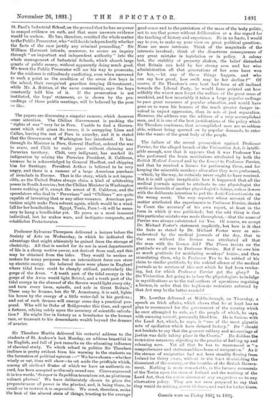Sir Theodore Martin delivered his rectorial address to the students
of St. Andrew's last Monday, an address beautiful in its English, and full of just remarks on the educating influence of classical study. To which school in politics Sir Theodore inclines is pretty evident from his warning to the students on the formation of political opinion :—" We have chosen—whether wisely or not, time will show—to set aside the printiple which, among all civilised States of which we have an authentic re- cord, has been accepted as the;only sound one. Cicero expressed it in ten words,' Sem per in Republica tenendum est, ne plurimnm valeant plurimi.' We have deliberately chosen to place the preponderance of power in the plurimi, and, it being there, to recall or to restrict it is impossible. We must, therefore, make the beat of the altered state of things, trusting to the average
good-sense and to the patriotism of the masa of the body politic, not to use that power without deliberation or a due regard for the teaching of history and experience. Be in no haste, I would say to you, to make up your view on great political questions. None are more intricate. Think of the magnitude of the interests involved ; think of the disastrous consequences of any great mistake in legislation or in policy. A colony lost, the stability of property shaken, the belief disturbed that Britain can hold by her strong arm and her wise administration all that generations of her sons have won for her, — lot any of these things happen, and who can say how great, how swift may be her decline P" Of course, if Sir Theodore's own bent had been at all inclined towards the Liberal Party, he would have pointed out how selfishly the wisest men forget the welfare of the great mass of mankind, and how invariably it takes a large popular suffrage to pass great measures of popular education, and would have gone on to warn his hearers of the much greater danger in- volved in unjust aggression, than in acts of just reparation. However, the address was the address of a very accomplished man, and it is one of the best justifications of the policy which Sir Theodore condemns, that accomplished men are so seldom able, without being spurred on by popular demands, to enter into the wants of the great body of the people.


































 Previous page
Previous page